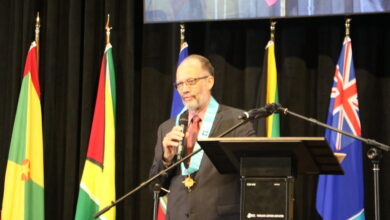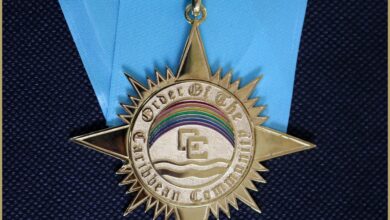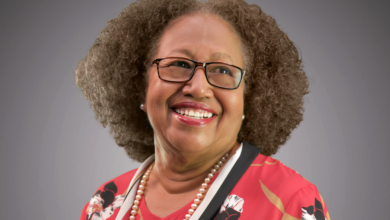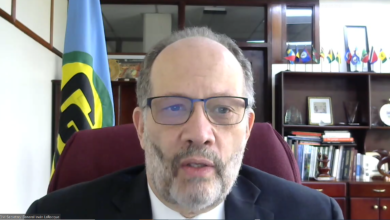It is indeed a great pleasure for me to join you at this session between the Caribbean Community (CARICOM) and UNESCO taking place at its Thirty-Seventh General Conference. I wish to express our appreciation to you, Director General, for affording the CARICOM delegations this opportunity to meet with you to discuss issues of specific importance to our Region. I also wish, at the outset, to commend your excellent leadership of UNESCO, so eloquently expressed by the Executive Board in its nomination for you to serve a second term at the helm of the Organisation.
This Thirty-Seventh General Conference is occurring at a critical time for both UNESCO and CARICOM, a period in which we are both examining and refocusing our efforts to ensure that they can make a meaningful contribution to improving the quality of life of our people. As CARICOM celebrates its fortieth year of regional integration it is in the midst of a major reform process as we chart a new course for the Community, seeking increased relevance and greater efficiency. This process includes the development of a Strategic Plan and the restructuring of the CARICOM Secretariat and the Community’s Institutions.
For your Organisation, Director-General, my understanding is that your process is principally in response to global challenges to peace and development. Of note, is your broadening of partnerships with the private sector, civil society and other inter-governmental organisations.
CARICOM, in spite of the myriad challenges faced by our Member States and by our Community as a whole, has recorded many successes over the forty years of its existence, especially in the social sector. Many of these coincide with the areas of competence of UNESCO, for example in education and culture and, more recently, in organising our Region to grapple with issues related to Climate Change and Sustainable Development. In spite of these general successes, many of which have received sterling support through our collaboration with UNESCO and other partner agencies, some of them persist while new ones have emerged.
Director-General, the processes leading up to the Third SIDS Global Conference (Samoa 2014) and the elaboration of the Post 2015 Development Agenda and Sustainable Development Goals, provide excellent opportunities for collective contemplation and reshaping of perspectives. I am confident that this Thirty-Seventh General Conference will focus on policies and initiatives required for the successful implementation of that Agenda and the achievement of those goals. Our Region has identified specific interests in this regard, including: a focus on investing in resilience beyond mere addressing of vulnerabilities; refocusing of education systems to address relevance to Twenty-First Century skill requirements and employability; addressing youth unemployment; and the development of critical life skills.
The issue of preparing young persons for life in a digital age and the implications for our education systems, both in terms of teacher education and school curricula, and the improvement of skills in Science and Mathematics, are high on the priorities for Human Resource Development in our Region. Addressing the challenge of attrition and under performance of males throughout our Caribbean education system is an on-going struggle. These are among the areas in which the cooperation with our development partners, including UNESCO, has proven invaluable, and we look forward to strengthening partnerships in these areas.
Our Community is known and respected internationally for its many traditional as well as contemporary, cultural expressions in areas such as music, art, craft, the literary and culinary arts, fashion, festivals and theatre. Over the past biennium, the increased efforts by UNESCO with regard to awareness building and the importance of preservation of our intangible cultural heritage, have been of significant benefit to the Region. There are so many traditions, indigenous medicines, beliefs, stories, symbols and songs which constitute a vital part of the rich cultural heritage of our people. These make us distinct and unique.
CARICOM Member States therefore have a deeply vested interest in the preservation, protection and promotion of this rich cultural heritage. This commitment is based on the belief in the importance of safeguarding our cultural heritage for our next generation, to preserve the rich knowledge and skills of our societies and ensure that these are transferred from generation to generation. This contributes to social cohesion and engenders a sense of our Caribbean identity and a sense of belonging.
The Convention for the Protection of World Cultural and Natural Heritage and the Convention for the Safeguarding of the Intangible Cultural Heritage are critical in this process. The CARICOM Secretariat will continue its efforts in encouraging Member States to become Parties to these Conventions.
We are also keenly aware of the need to improve the preservation of our architectural heritage and in this regard we welcomed with enthusiasm in 2011, the addition of Historic Bridgetown and its Garrison to the List of World Heritage Sites. We look forward to the assistance of UNESCO in capacity building for preparing our Community to have further sites listed.
Over the years, the Member States of the Caribbean Community have had a mutually beneficial relationship with UNESCO. Today, ten years after the signing of the last CARICOM/ UNESCO Memorandum of Understanding, we are pleased to further reaffirm and strengthen that relationship through the signing of a revised Memorandum of Understanding. The revised MOU builds on our existing co-operation and addresses some of the emerging issues that now underpin the Community’s development in more fundamental ways. These include the building of inclusive knowledge societies, fostering innovation, inculcating appropriate life skills, and addressing several of the inter-connected issues which will be brought together to address our development needs.
A number of these issues will also feature prominently in the Post 2015 Development Agenda and Sustainable Development Goals. The cultural component of the Agreement also addresses capacity building for cultural industries which is of specific relevance to our Region as we roll out the recently approved CARICOM Cultural Industry Strategy.
The signing of this MOU today will certainly take our cooperation further as we implement the programmes so critical to the development of our countries and societies and to the quality of life of the people of the Caribbean Community.
Director General, I wish, on behalf of the Community and its people, to express deep appreciation to you and to UNESCO for your cooperation and collaboration and to say that we look forward to the deepening of this engagement in the coming years.
I thank you.





